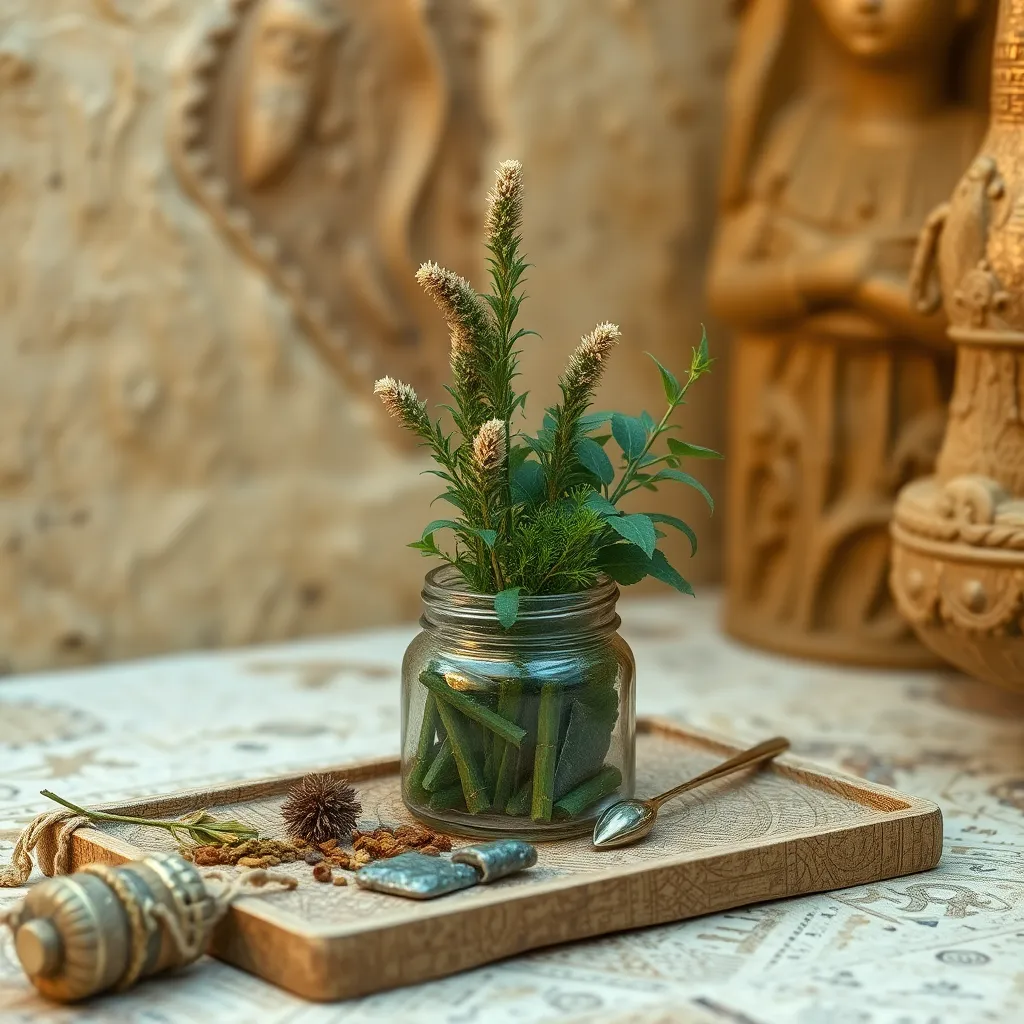The Role of Sacred Herbs in Egyptian Ritual Offerings
I. Introduction
Ancient Egyptian spirituality was deeply intertwined with the natural world, particularly through its complex rituals and offerings. These practices were not mere ceremonies; they were essential expressions of faith, aimed at honoring the gods, ensuring cosmic order, and securing a place in the afterlife. One of the most significant aspects of these rituals was the incorporation of sacred herbs, which played a vital role in enhancing the spiritual experience and connecting the physical and divine realms.
II. Historical Context of Sacred Herbs in Ancient Egypt
The use of herbs in ancient Egyptian culture dates back thousands of years, reflecting a society that revered nature and its gifts. Archaeological findings suggest that herbs were utilized not only for their medicinal properties but also for their spiritual significance. Historical texts, such as the Ebers Papyrus, reveal the extensive knowledge Egyptians had about various plants and their uses.
Herbs were integral to daily life, used in cooking, medicine, and rituals. They symbolized life, death, and rebirth, making them essential in the context of spirituality and the afterlife.
III. Types of Sacred Herbs Used in Rituals
Among the myriad of plants utilized in ancient rituals, several sacred herbs stood out for their unique properties and meanings. Here are some prominent examples:
- Kykeon: A ceremonial drink made from barley and herbs, often associated with mystery rites.
- Myrrh: Valued for its aroma and preservative qualities, myrrh was used in embalming and as an offering to deities.
- Frankincense: Known for its fragrant resin, frankincense was burned in temples to purify spaces and invite the presence of the divine.
- Lotus: The blue lotus was a symbol of creation and rebirth, often depicted in art and used in various religious ceremonies.
Each of these herbs carried specific symbolic meanings, often linked to the gods or fundamental concepts in ancient Egyptian cosmology.
IV. Preparation and Application of Sacred Herbs
The preparation of sacred herbs involved meticulous rituals that underscored their importance. Priests and priestesses were responsible for the careful selection and processing of these plants, often performing sacred rites to imbue the herbs with spiritual significance.
Common applications of herbs included:
- Incense: Herbs were burned to create incense that filled temples with divine fragrances.
- Oils: Infused oils were used for anointing statues of deities and in personal rituals.
- Offerings: Bundles of herbs were placed on altars as offerings to gods, symbolizing gratitude and devotion.
These rituals not only honored the deities but also reinforced the community’s connection to the divine.
V. The Spiritual Significance of Herbs in Offerings
Sacred herbs were believed to be more than just physical objects; they were seen as conduits for communication with the divine. Each herb had its own association with specific deities and spiritual concepts.
For instance:
- Myrrh was linked to Isis, symbolizing healing and protection.
- Frankincense was associated with Ra, the sun god, representing light and purity.
These connections underscored the belief that herbs could facilitate a transformative experience, allowing individuals to reach out to the gods and receive divine blessings.
VI. Case Studies of Rituals Featuring Sacred Herbs
One of the most notable rituals involving sacred herbs was the burial practices of ancient Egyptians. During mummification, herbs like myrrh and cedar were used to preserve the body and protect it in the afterlife. Additionally, festivals such as the Wepet-Renpet, the New Year festival, featured the use of herbs in offerings to ensure fertility and abundance for the coming year.
Historical accounts, such as those by Herodotus, detail the elaborate use of herbs in these ceremonies, highlighting their significance in connecting the living with the deceased and the divine.
VII. Modern Interpretations and Uses of Sacred Herbs
The legacy of ancient Egyptian herbal practices continues to influence contemporary spirituality and herbalism. Many modern practitioners draw inspiration from the rituals of the past, incorporating sacred herbs into their own spiritual practices.
Today, the revival of ancient Egyptian rituals can be seen in various forms:
- Herbalism: The study and use of herbs for healing and spiritual purposes are on the rise, with a focus on traditional practices.
- Spirituality: Many modern spiritual paths incorporate herbal offerings as a way to connect with ancient wisdom.
The enduring relevance of these herbs serves as a testament to their deep-rooted significance in spiritual and cultural practices.
VIII. Conclusion
In summary, sacred herbs played an essential role in the rituals of ancient Egypt, bridging the gap between the physical and spiritual worlds. Their significance extended beyond mere offerings; they were symbols of life, death, and divinity. The practices surrounding these herbs have left a lasting legacy, influencing modern spirituality and herbalism.
Exploring the rich traditions of ancient Egyptian spirituality and the role of sacred herbs invites us to appreciate the profound connection between nature and the divine, encouraging a deeper understanding of our own spiritual journeys.




